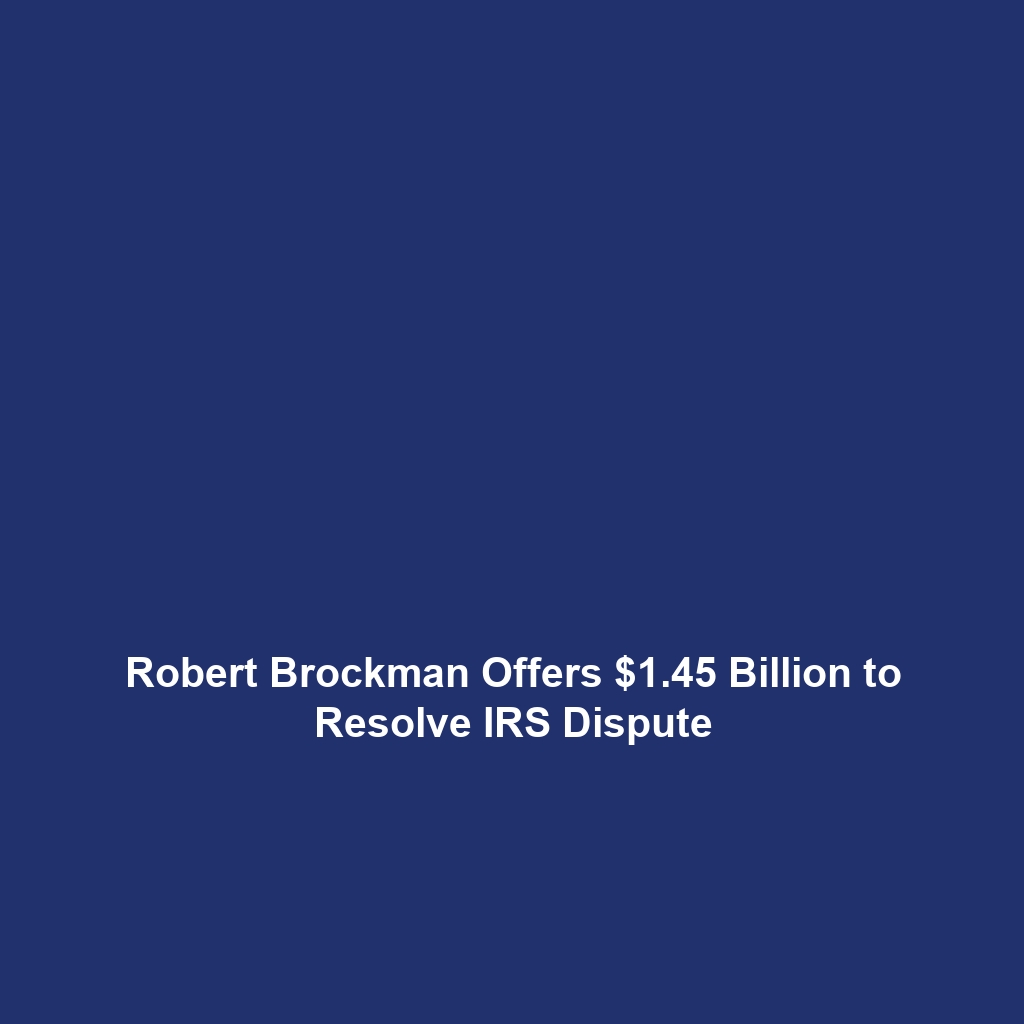Your cart is currently empty!
Tag: legal implications

Brockman’s $2 Billion Tax Case Sparks Debate Over IRS Oversight
Brockman’s $2 Billion Tax Case Sparks Debate Over IRS Oversight
Brockman’s $2 Billion Tax Case Sparks Debate Over IRS Oversight
In a landmark case that has captured national attention, the $2 billion tax fraud allegations against Robert Brockman, former CEO of Reynolds and Reynolds Co., highlight significant flaws in federal tax compliance and enforcement mechanisms. This case has raised questions not only about Brockman’s actions but also about the efficacy of the Internal Revenue Service (IRS) and its oversight capabilities.
Background of the Case
Robert Brockman was indicted in July 2020 for orchestrating a massive tax evasion scheme, which reportedly spanned over a decade. According to the indictment, Brockman is accused of hiding $2 billion in income from the IRS by creating a complex web of offshore accounts and trusts. The U.S. Department of Justice alleges that Brockman used these tactics to avoid taxation on substantial profits he generated through the sale of software and technology companies.
Federal prosecutors have characterized the case as one of the largest tax fraud cases ever brought against an individual in the United States. The gravity of the situation is compounded by the fact that Brockman, aged 80, is now facing trial, which raises numerous legal and ethical questions regarding the timeline of investigations and prosecutions for such substantial cases of tax evasion.
IRS Oversight Under Scrutiny
The Brockman case has prompted a scrutiny of the IRS’s oversight and enforcement capabilities, particularly regarding high-profile and wealthy individuals. While the IRS utilizes various methods to monitor and enforce tax compliance, critics argue that the agency has been underfunded and overburdened, leading to difficulties in effectively tracking vast networks of offshore finances.
Tax compliance expert Professor Michael Graetz, from Columbia University, commented, “The IRS has historically struggled with cases involving complex financial structures. It often lacks the resources to fully investigate such extensive fraud schemes unless they come to light through other means.”
Legal Implications and the Broader Context
As the Brockman case unfolds, it serves as a critical reference point for understanding how tax fraud is prosecuted in the United States. Legal experts warn that the case may set significant precedents concerning the government’s ability to enforce tax laws against wealthy individuals.
Legal analyst Sarah Smith stated, “This case reflects a growing trend of the federal government taking a firmer stance against tax evasion, especially among those with complex financial portfolios. How the court rules will likely influence similar cases going forward.”
The implications of the case extend beyond just the immediate legal outcomes. It raises essential questions about fairness in the tax system. For many middle-class Americans who may not have similar resources to shield their income, the case serves as a stark reminder of potential inequities in federal tax policies.
Public Reaction and Legislative Considerations
Public response to the Brockman case has been polarizing. Many view it as an opportunity to push for tax law reform, emphasizing the need for a more robust IRS with sufficient resources to pursue tax evasion aggressively. There is an increasing call for transparency in how the IRS handles audits, especially concerning its wealthy taxpayers.
A report from the Treasury Inspector General for Tax Administration noted that the IRS’s audit rates for high-income earners have significantly decreased in recent years, leading to concerns about whether the agency can adequately enforce existing tax laws. This has led to calls from various advocacy groups for increased funding to ensure that the IRS can effectively carry out its mandate, ultimately benefiting public trust in the tax system.
Future Implications for the IRS and Tax Law Enforcement
As the Brockman case proceeds, it could spur a reevaluation of how the IRS operates, particularly regarding enforcement against high-net-worth individuals. Lawmakers are under pressure to consider comprehensive tax reform that could address vulnerabilities in the existing system.
Economic policy expert Dr. Emily Kaufman emphasized, “The Brockman case underscores the critical need for a tax system that is equitable, ensuring that individuals cannot use their resources to circumvent their legal obligations. It’s a wake-up call for both the IRS and Congress.”
Conclusion
The Brockman tax fraud case is not just about the legal fate of one individual; it is a reflection of broader systemic issues within the IRS and the federal tax system. It raises essential questions about compliance, enforcement, and fairness in tax policies, spurring debate among policymakers, experts, and the public. As the case unfolds, all eyes will remain on the legal proceedings, the IRS’s response, and the potential reforms that may arise in the aftermath of this high-profile tax fraud allegation.
